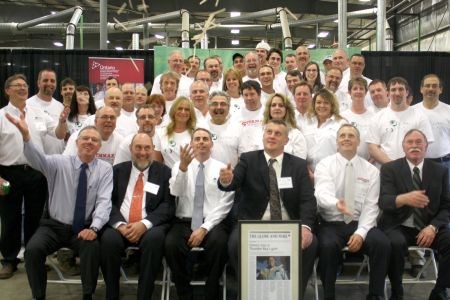Call it a fortuitous Google search for Thunder Bay.
An Internet hunt for white birchwood, which led a British Columbia ice cream stick manufacturer to northwestern Ontario, has led to a factory that is now open for business.
Almost two years after the news first broke that Global Sticks was coming to Thunder Bay, the Surrey-based novelty wood company began pumping out product at its new factory on the outskirts of the city in late May.
But just getting to the ribbon-cutting stage was a garden of agony for city officials and company management who faced a myriad of engineering, government regulatory and financing obstacles that delayed start-up by a year.
“All the banks said, great idea, but wrong timing,” said company president Reggie Nukovic, a former restaurant supply salesman.
A combination of the recession and the banks' adversion to finance anything in the forestry sector made for some tough sledding in trying to raise working capital.
“This deal took 1,137 days to do,” said Steve Demmings, CEO of the Thunder Bay Community Economic Development Commission, whose staff shepherded the company through the site selection process, bureaucratic redtape and a search for project funding sources.
Global Sticks and its partner, Stormax International, specialists in packing machinery, are operating out of a combined 85,000 square feet of new space which has the potential to create 145 jobs with expansion. Currently, Stormax has 10 employees on site.
Demmings called the opening of two factories, “very satisfying” because of the time spent on the file since early 2008. The fact that the plant is in the neighbouring rural municipality of Oliver Paipoonge is of no concern to Demmings.
“All we want are the jobs in the region.”
Northern Lights Credit Union and the TD Bank stepped up as the company's equipment lender and to finance day-to-day operations.
With the commission's assistance, the company picked up $5.23 million in provincial grants and loans since 2009 to buy machinery.
“We have $6 million on the ground in equipment with $2.5 million to $3 million to come,” said Nukovic, of his firm's total build budget of $15 million.
For Thunder Bay contractors and engineers, he estimates they've spent $7.5 million to $8 million.
The new plant contains a mix of new and refurbished stick manufacturing and packing equipment from Denmark, Spain and Wisconsin, the latter by eliminating a U.S. competitor in Solon Manufacturing. Nukovic's company absorbed Solon's equipment, customers and hired one of the staff as Thunder Bay plant manager.
Global Sticks used to import wooden sticks from China used for ice cream bars, corn dogs, tongue depressors and paint paddles.
Their story and the decision to pull up stakes in Dalian, China and establish a Canadian factory is a well-publicized twist of irony.
The cost of doing business in China had become prohibitively expensive for the company.
Starting in 2006, Beijing eliminated a 13 per cent Value-Added Tax (VAT) rebate and imposed a 10 per cent export tax in a matter of months.
The steady appreciation of the yuan and the cost of raw material were driving up costs. As Chinese forests were becoming depleted, birchwood coming across the Russian-Siberian border was being slapped with a value-added export.
As more global corporations moved into the region, Nukovic said it was a headache keeping a workforce together than constantly went AWOL after the Chinese New Year. Paying employees US$300 a month didn't cut it anymore.
Workers in Thunder Bay will fare substantially better with a generous benefits package and salaries starting at $15 an hour.
When the B.C.-born Nukovic scoped out his home province for birch, he found slim pickings and no provincial support.
An Internet search showed an unused and abundant supply of birchwood near Thunder Bay and a representative made contact with Demmings in early 2008.
To make 8 billion ice cream sticks a year, Nukovic said they'll use 80,000 to 100,000 cubic metres of birch annually. All of it is sourced privately since the company failed to secure fibre through the province's wood supply competition.
Nukovic was reluctant to name customers, but said they range from Mom-and-Pop outfits to Fortune 500 companies.
Though operations are just barely underway, more investment and expansion is on the horizon.
North America is the plant's target market, but Nukovic said they've been taking queries from Japan, South Korea, Indonesia, Australia and parts of Europe.
Eventually, they'll ship out novelty stick items by container to Asia by rail and marine transport.
“We're going to compete in certain market segments against the Chinese,” said Nukovic. “The sky's the limit. We're talking about seven-inch coffee stir sticks for Starbucks.”
With the factory opening drawing a second round of national media exposure, Demmings couldn't resist the opportunity to promote Thunder Bay's can-do spirit.
“It's a hard example of what a lot of other communities in Canada talk about, but really haven't been successful doing. At least 300 of them have lost (jobs) through major forestry mill closures. This is a really great example of value-add in the wood industry.”




